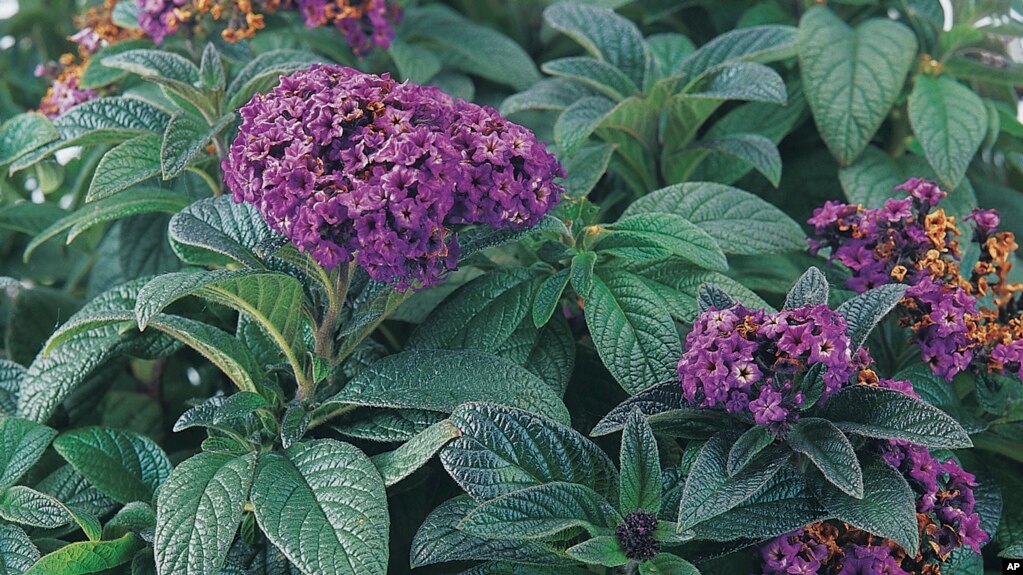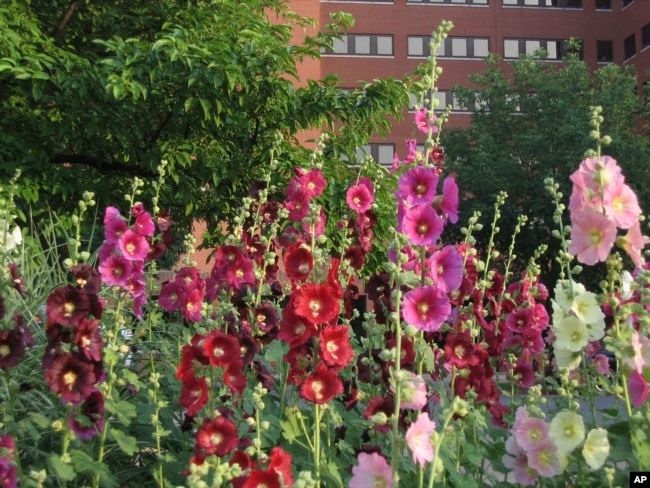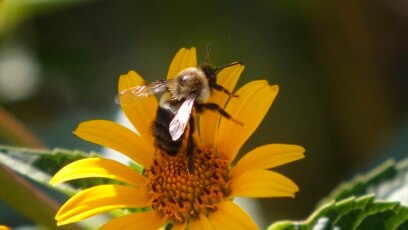
This image provided by Proven Winners shows a sweetly scented heliotrope flower, an old-time garden favorite. (Proven Winners via AP)
In Thornton Wilder’s 1938 play Our Town, people gather to enjoy the beloved scent of heliotrope flowers in the moonlight.
The scene is memorable. At the time, the wonderfully light, but deeply sweet smell of heliotrope could be found in most American gardens.
Today, however, these flowering plants are rarely seen, or smelled, in the United States. Americans stopped growing heliotrope and other Victorian period flowers. Hybrids and small, dense bedding plants are the substitutes in many gardens.
Gardening expert Jessica Damiano writes for the Associated Press. She regrets the disappearance of these once common plants. In a recent report, she writes that gardeners should consider planting Victorian garden flowers.
Four o’clocks (Mirabilis japala, Mirabilis multiflora)
Damiano suggests four o’clocks as one candidate. These white, red, pink, purple, or yellow, flowers are shaped like trumpet musical instruments. Their petals open daily in late afternoon. They appear from spring until frost – the time when ice starts to form overnight.
The plant for these flowers does not require much care or water. It renews easily and gives out a sweet, lemony scent that brings bees, butterflies and hummingbirds to the plant to feed.
Cosmos (Cosmos bipinnatus)
The daisy-like cosmos grows from early summer through frost. Some even grow year-round in warmer climates. All of them self-seed, ensuring the flowers grow for years to come.
The plant should grow in full sun, except for in southernmost areas, where they can use some shade. The flowers are colored in yellow, pink, orange, red, purple, white and maroon.
Sweet peas (Lathyrus odoratus)
Pink, purple, red, white or mixed color, the vine plant sweet peas blooms yearly during spring and early summer. The flower carries the scent of grapes in full sun in northern zones. In the south, it requires some afternoon shade.
Kiss me over the garden gate (Persicaria orientalis)
Kiss me over the garden gate was a favorite flower of America’s third president, Thomas Jefferson.
This easy-care plant grows to nearly 2 meters tall making it perfect for the back of the garden. Its pink flowers hang from the plant in big bunches. In areas with cold winters, plant the seeds directly into the garden in autumn; in warm climates, keep them very cold for a week before planting outside.

Hollyhocks (Alcea rosea)
Pink, purple, peach, red, white, yellow or near-black, hollyhock flowers will cover the plant’s 2.5 meter tall stalks from top to bottom. The large-leaved plants are biennial, which means they live for two years and bloom only in their second year. But they do self-seed, so there will always be more flowers to come.
Plant them in full sun in the north and part shade in hot climates and provide a fence or similar structure for support.
English primroses (Primula vulgaris)
There are nearly 500 kinds of primroses in many colors. But most gardens likely include the yellow-flowered ones. The short-lived flowers that return yearly prefer partly wet, partly shady conditions. Grow them in winter in the south and the spring elsewhere.
Soapwort (Saponaria)
Soapwort is a flowering herb. The groundcover blooms in late-spring and summer. It returns every year and can grow as high as one meter. Plant seeds directly into the garden in a sunny spot in spring. Remove dead flowers to avoid overgrowth.
You can make a liquid cleanser from soapwort. Cut up about 130 grams of the plant’s leaves and stems. Place them in around 500 milliliters of boiling water. Bring down the heat to a low setting and cook for 15 minutes. Then, cool the liquid and use.
Heliotropes (Heliotropium arborescens)
With a wonderful, strong scent of cherry, almond and vanilla, heliotropes are grown yearly and available in several colors. The dark purple color flower was noted in the famous Thornton Wilder play.
Plant them in full sun everywhere except the deep South. There, the flowers will do best if provided some afternoon shade.
I’m Jill Robbins. And I’m Dan Friedell.
Jessica Damiano writes about gardening for The Associated Press. Hai Do adapted her story for Learning English.
_____________________________________________________________________
Quiz – Eight Garden Flowers Worth Revisiting

Start the Quiz to find out
____________________________________________________________________
Words in This Story
scent – n. a pleasant smell that is produced by something like flower
scene – n. part of a play in which a particular action takes place
hybrid – n. something that is formed by combining two or more things
petal – n. the soft, colorful part of a flower
shade – n. a dark area where the sun is blocked
stalk – n. a thick or tall stem part of a plant
stem – n. the long, thin part of flower, leaf or fruit that connects it to its plant